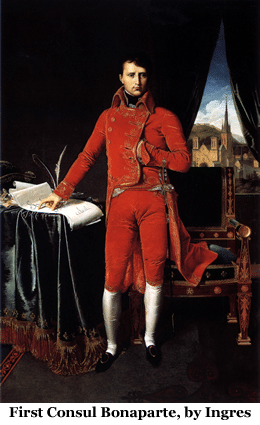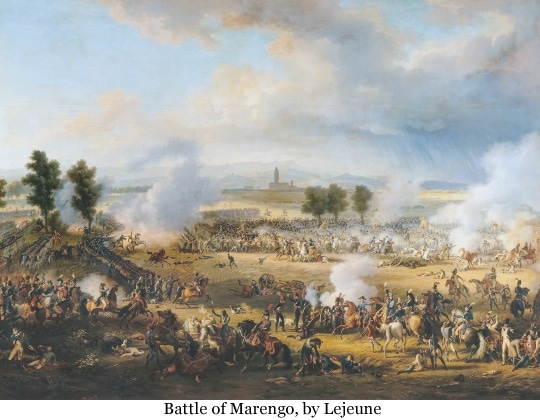From Consul to Emperor
There was an eye to see in this man, and a soul to dare and do.
He rose naturally to be King. All men saw that he was such.
–Thomas Carlyle

Meanwhile, a perceptible malaise had permeated the French capital, where unemployment and inflation were rampant and speculation about an eventual return to Bourbon rule was being bruited about in the cafes. Of the five Directors who had headed the government upon Napoleon’s departure for Egypt, only Paul Barras was still in power. Indeed, Barras had grown rich from the sale of public offices and would be implicated in a royalist plot. The situation was worse than Napoleon had imagined, and his popularity throughout the country now compelled him to seek a role of political leadership. His first thought was to seek election to the Directory, but the Constitution stipulated that no one under forty could sit on the ruling panel and at thirty he was not even close. At a loss as to how to proceed, he met with one of the sitting Directors, Joseph Sieyes, who in turn had been eager to enlist the support of the newly-returned military hero. Though Napoleon personally detested Sieyes, and for his part, Sieyes had no intention of helping the general wrest political leadership from the ruling class of lawyers of which he was a part, together the two decided on a scheme to dismantle the Directory and create a new regime.
Using his influence in the existing government, Sieyes prevailed upon three of his fellow Directors to resign while a new Constitution was formulated by the legislature. At the same time, with the government clearly in transition, Napoleon invited a group of senior army officers to join him on a “journey.” Dressed in civilian clothes and presenting himself as a moderate capable of reconciling royalist and republican factions, he enlisted the army chiefs in the planned coup d’etat, winning them over one by one in private conversations. The coup was to be carried out on 10 November 1799–19 Brumaire according to the season-based Revolutionary calendar. On this day, at Sieyes’ prompting, an emergency session of the Council was to meet in the Paris suburb of Saint-Cloud, and out of concern for its safety, General Bonaparte was placed in charge of all troops in the Paris district.
With a number of key figures supporting his bid for political leadership (including his brother, Lucien, president of the Five Hundred), it remained for Napoleon to put the best possible light on the planned takeover. Exercising de facto power at the head of the Legislative Guard, he planned to attend the meeting and present himself to the Council in the role of savior of the Republic, fresh from the conquest of Egypt. On the foggy morning of 19 Brumaire, he arrived at St. Cloud to discover that the meeting of the Elders had been delayed until the rooms in which they were to deliberate could be furnished in a suitably elegant and imposing style. It was mid-afternoon before such conditions were met, and when at last the group came to a decision, it was not to create a new Constitution as he had hoped but to prepare for the election of four new Directors according to the existing document.
At this point, Napoleon entered the hall and began to speak. Swearing allegiance to the Republic, he warned of various conspiracies currently afoot, naming two Directors, Barras and Moulins, who had approached him with plans to overthrow the existing government. He then offered to save the Elders from such dangers, and, alluding to the soldiers that awaited outside the hall, he boasted, “With them, I have founded Republics.” The 250 members of the Elders did not quite know what to make of this. Though many were openly sympathetic to him, there was a general buzz of bewilderment and disapproval. His were not the words of a parliamentarian, and as the legislators drew back, Napoleon grew more frustrated and impatient, increasing the pitch of his inflammatory rhetoric. Perhaps recalling the danger he had faced at the time of the Terror, he threatened to crush anyone who might seek to outlaw him, and in a final flourish of bombast reminded the assembly that he marched “accompanied by the god of victory and the god of fortune.” With this, he lost his audience altogether (these were not soldiers to be led with fiery slogans, but statesmen attuned to rhetorical subtlety), and amid angry outcries, he was ushered from the hall.
With the strident voices of the Elders still ringing in his ears, Napoleon now strode into the larger and less formal hall where the Council of the Five Hundred was in session. Here, he no sooner made his appearance than cries arose to outlaw him and he was set upon by angry members who physically accosted him, leaving scratches on his face. Visibly shaken, he was rescued from further violence by four grenadiers who escorted him out of the hall. Next, his brother Lucien, president of the assembly, having failed to persuade the members to allow Napoleon to speak, offered to resign his office, to which the deputies responded by reassuring him of their confidence. In the process, a semblance of order was restored, and during this interval, Lucien sent a hurried note to Napoleon, calling upon him to act quickly.
For once, however, Napoleon was utterly stymied, the idea of taking over the government by force violating his sense of both deserving and destiny. When nothing happened for half an hour, another squad of grenadiers entered the assembly to lead Lucien out. Now, at the urging of Sieyes, the two brothers determined to clear the hall. Addressing the soldiers of the Legislative Guard, Lucien reported that a group of fanatics was threatening the lawful proceedings of the Five Hundred. Napoleon–his face still bloody from his encounter with the angry deputies–spoke of having escaped with his life. Convinced of their duty, the soldiers fixed bayonets and entered the hall, stampeding the representatives of the people, who fled by every available means of egress. Several hours later, duly intimidated, a portion of the Council was reconvened and both legislative bodies voted for a provisional government to be ruled by three Consuls: Joseph Sieyes, Pierre Ducos, and the hero of the hour (as the pamphlets he had printed would portray him)–Napoleon Bonaparte.
While Napoleon had clearly wished to gain political office under less coercive circumstances, it was not a time to quibble about methods. Europe was entering a new century, and if the ideals of the Revolution were to survive they would have to be reconciled with the realities of the present. Thus, with supreme confidence in his ability to articulate those ideals, Napoleon set to work. The first order of business was to secure a legal basis for the new regime, to which end a new constitution was rammed through an abbreviated legislative process and declared to be in force in advance of the national plebiscite that was to give it popular approval. Meanwhile, with little regard for the legitimacy of the Council’s initial ruling, he convinced his fellow consuls to accept positions as senators while he himself became First Consul with broad powers. Thus, in a remarkably short period, the government reverted to a virtual dictatorship.
Even so, given the trend of recent events, the French populace came to accept the new order with remarkable equanimity. After years of indecision, turmoil, and corruption, an era of governmental expedience came as a welcome change. Many Frenchmen supposed that Bonaparte represented an end to the Revolution and a transition back to Bourbon rule, and indeed the effect of many of Napoleon’s efforts was reminiscent of the recent past, invoking a sense of order and stability all but forgotten in French society. Nowhere would this transition be more salutary, perhaps, than in the area of finance. Upon the advent of the Consulate, the government’s exchequer contained less than 200,000 francs, with outstanding debts of close to 500 million. Government workers hadn’t been paid in close to a year, nor was there a uniform process for payment or resupply of the Army. While the officials of the Directory had grown fat from graft and corruption, the government itself had been left on the verge of bankruptcy. Guided by the experience of funding his campaigns at the expense of the conquered and by his own native thrift, Napoleon moved quickly to confront the problem. Raising close to fifteen million francs from borrowing and lottery proceeds, he covered the government’s immediate debts and set about reorganizing the collection of taxes, a task previously managed by part-time collectors on an irregular basis. Applying a new standard of administrative discipline to the process, the new First Consul made tax collection a full-time job and required that collectors pay the government a percentage of their expected revenues in advance, instilling in them a keen sense of diligence toward the work. Further, in an effort to institutionalize budgetary responsibility within the government, he created two separate entities, the Treasury and the Ministry of Finance, with oversight of income and expenses respectively. The adversarial nature of the two bodies provided a built-in disciplinary mechanism, serving to balance the budget and keep it in balance throughout the Consulate years.
The same sort of discipline would be applied to the hopeless jumble of laws, jurisdictions, and decrees that comprised the French legal system. Moving with characteristic dispatch, Napoleon gave a commission of four respected jurists six months to provide the outline for a new system that would combine the enlightened ideas of the Revolution with the best principles of traditional French law. Drafted as early as December 1800 though not passed until 1804, the resulting Civil Code–known as the Code Napoleon in recognition of his substantial role in its formulation–would bring much-needed coherence and uniformity to the administration of justice, becoming a long-standing model of legal reform.
From finance to law, from education to infrastructure, there was scarcely a facet of French life that did not undergo dramatic improvement under the Consulate. Like Caesar Augustus, Napoleon proved as gifted a civil administrator as he was a military commander, taking a firm hold of political power and bringing order and discipline to a growing empire. And like Augustus, he would do so largely in abeyance of the republican ideals which he presumed to champion. Though his dictatorial methods would be condemned by contemporaries and historians alike, given the volatile political circumstances under which he had assumed power it is difficult to imagine how he might have proceeded (or the Republic might have endured) by any other means. Yet for all of his success in consolidating power unto himself, his situation during the early years of the Consulate was anything but secure. In addition to ongoing domestic unrest, the country continued to be surrounded by hostile states prepared to invade at the slightest sign of weakness. Responding to this external threat as early as January 1800, Napoleon gave orders for the creation of a Reserve Army of 60,000 men to be organized at Dijon under his trusted chief of staff, General Berthier. Though as a civilian leader the First Consul was not technically allowed to lead an army in the field, the Reserve Army would be his to command, and with his own political future at stake, he could scarcely afford to have it any other way. If experience had taught him anything, it was that success on the battlefield was the surest way to secure the confidence of the French nation.

